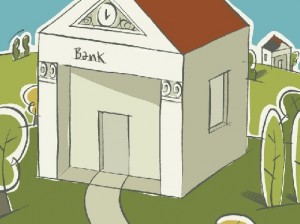 My son asked why I don’t just plonk by money into a safety deposit box to tap into those wonderful gross margins that banks earn buy ‘buying’ your money at 3% and ‘selling’ it back to you (or to other people/businesses) at 7%.
My son asked why I don’t just plonk by money into a safety deposit box to tap into those wonderful gross margins that banks earn buy ‘buying’ your money at 3% and ‘selling’ it back to you (or to other people/businesses) at 7%.
That lead to a great discussion on P2P lending, which partially addressed the problem of risk for me: P2P offers filters to allow you to sort loans; ratings to allow you to evaluate loans; and FICO-based ‘risk rated’ interest rates (circa 10%) to go along with all of this.
But, that doesn’t satisfy me …
And, it’s not because the banks have MUCH better systems to evaluate and manage loans and it’s their core business, it’s because I can do much better with my limited capital than P2P levels of interest.
Here’s two things to think about:
– Does P2P provide the annual compound growth rate that YOU need to reach your Number?
– Do you have the bank’s virtually UNLIMITED access to capital or is the amount that you can apply to P2P as a % of your Net Worth limited?
These points are critical: you have a limited amount of investment resource available to you and (probably!) a very large Number / soon Date to achieve using what you currently have as a springboard.
Now, let’s flip to the other side:
Banks dig into their ability to borrow (which IS the basis for their entire business, investment banking / asset management services aside) and lend to us for what?
Either to SPEND (on consumer items, if we are dumb) or to INVEST (in our homes, businesses, etc.) if we are smart.
So, let’s put those things together to create our own ‘bank’:
1. We have limited cash to ‘lend’ at our disposal, so we need to find a way to tap into vast amounts of borrowing power just like the banks.
2. Well, we don’t have the Regulations, Reputations, and Resources (e.g. access to the capital markets) that allow the banks to borrow (then lend) so much, but we do have something that allows us to achieve effectively the same huge jump in personal borrowing capacity: the spare equity in our houses.
[AJC: You knew there was a catch! If you don’t have a house, have GFC’ed your equity out the window, or otherwise don’t have enough equity built up yet, bookmark this post and take the rest of the day off …]
3. If you DO have spare equity in your house, and can refi. to a fixed rate loan that locks in your borrowings circa 4% or so then you are probably now sitting on a relatively large sum of cash to lend, just like a bank (relatively speaking!).
4. So, you can either:
– Do, what the banks do and lend to somebody who needs the cash at a higher rate; e.g. P2P where you may get 10% for each 4% ‘unit’ that you supply … a VERY healthy 150% gross margin (plus, you have NO staff or overheads), OR
– Do, what I would recommend: cut out the middle-man and lend the money to yourself!
What would you do with that money that you have borrowed?
What any sensible investor would do with money that they borrow from the bank – depending upon their Number and their appetite for risk:
– Buy some investment real-estate,
– Buy stock [AJC: a friendly ‘bank manager’, no margin calls …. sweet],
– Start a business … it could even be a P2P lending business 😉
That last one isn’t such a joke; I would be more tempted to invest IN a P2P business than I would be to lend VIA a P2P. Why?
It’s simple … the former gives me ho hum 10% returns (with some credit risk attached), whilst the latter gives me access to potentially, unlimited returns!
Are you worried about the risk of business failure?
Well, if the P2P site goes under, isn’t my risk of capital loss the same as if my cash was sitting in their investment accounts [AJC: which is one of the reasons why the SEC is VERY interested in regulating P2P, all of a sudden … but, until they do … 😉 ]?



 Guys, as the economy improves (if it improves) interest rates will surely rise, as they already are in other countries.
Guys, as the economy improves (if it improves) interest rates will surely rise, as they already are in other countries.
 Well,
Well,  If you needed any evidence that the ‘global financial crisis’ – on a global macro level – and problems with the US real-estate market – on a global micro level – are still affecting people in the their day to day lives, you need read no further than
If you needed any evidence that the ‘global financial crisis’ – on a global macro level – and problems with the US real-estate market – on a global micro level – are still affecting people in the their day to day lives, you need read no further than  I wrote a
I wrote a 